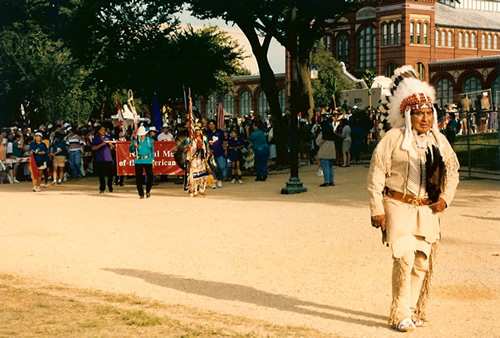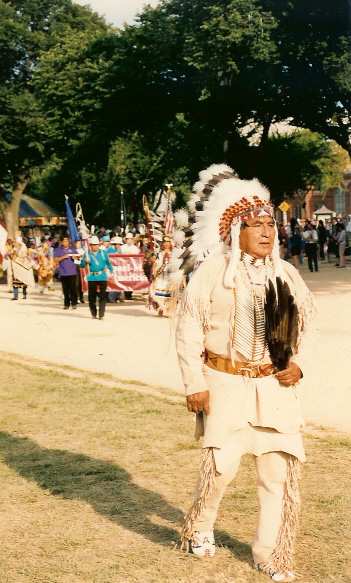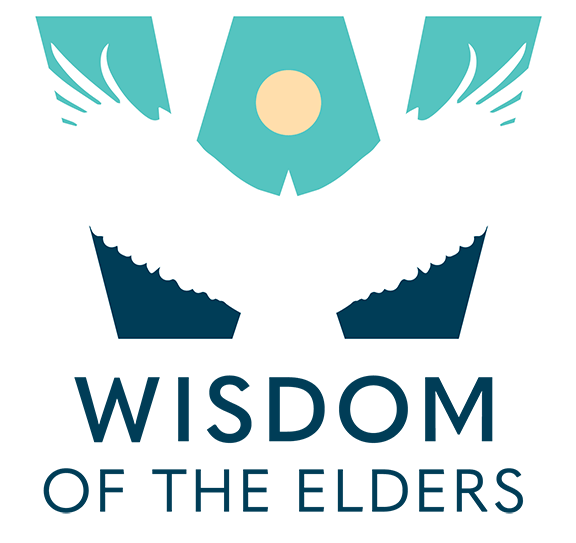I’m Doing This Because I am a Man
 My name is Moses Starr and I’m a southern Cheyenne of Oklahoma. This morning I just want to tell you a little bit about the tribes on the Plains and the way that they lived a long time ago before the Englishmen or the Spanish came over.
My name is Moses Starr and I’m a southern Cheyenne of Oklahoma. This morning I just want to tell you a little bit about the tribes on the Plains and the way that they lived a long time ago before the Englishmen or the Spanish came over.
They lived in a section, the Plains Indians, between the Mississippi and the Rocky Mountains. They depended on the buffalo for the three essentials of life, which is food, clothing, and shelter. With this, they hunted the buffalo, and at one time, and it is written, that there were sixty million buffalo that roamed this area. And there wasn’t just one tribe. There were a lot of tribes that roamed this area and depended on the buffalo.
A long time ago they fought each other for the territories that they had, or they went in just to get some of the things that the other tribes had, and the Supapai Cheyenne went into another territory. One boy was wounded in that skirmish. As they were coming back on the northeast corner of New Mexico there were seven hills and that’s landmarks of the Cheyenne. Each hill has a name, a Cheyenne name. But this boy that was wounded and the enemy was catching up with him and so he asked to be put on one of those hills and left because so he was slowing them up.
As they were leaving they heard him singing a song. And in that song he mentioned, he said in Cheyenne, “My friends and my relatives, I know that what I’m doing is dangerous, but I’m doing this because I am a man.”
Moses Starr
 Moses Starr is of the southern Cheyenne of Oklahoma. He lives in Weatherford, Oklahoma. From the age of about five years old until he was fourteen he stayed with his grandmother, Soar Woman, until her passing. He learned a lot of his culture from her many teachings. On his father’s side of the family, his great grandfather’s name was Big Moccasin. He was one of the headsmen of the tribe for the Bowstring clan. On his mother’s side her father, Heap of Birds, was a headsman in the Bowstrings Clan. Moses still speaks the Cheyenne language. His children can speak Cheyenne, but they also speak Arapaho.
Moses Starr is of the southern Cheyenne of Oklahoma. He lives in Weatherford, Oklahoma. From the age of about five years old until he was fourteen he stayed with his grandmother, Soar Woman, until her passing. He learned a lot of his culture from her many teachings. On his father’s side of the family, his great grandfather’s name was Big Moccasin. He was one of the headsmen of the tribe for the Bowstring clan. On his mother’s side her father, Heap of Birds, was a headsman in the Bowstrings Clan. Moses still speaks the Cheyenne language. His children can speak Cheyenne, but they also speak Arapaho.
The territory of the southern Cheyenne stretched between the Mississippi River to the Rocky Mountains,
Mostly in South Dakota, Colorado, and most of west/northwestern Oklahoma.
Moses contributes history, storytelling, songs, and culture in his presentations. He can sing the War Dance, Round Dance, Gourd Dance, and ceremonial songs. With respect he was made Cryer of two ceremonies; renewal of Sacred Arrows and the Sun Dance. Along with singing, he makes his own drums, which was an art his father passed down to him. In the classroom, he teaches children how to Round Dance and War Dance. When teaching the history of the tipi he sets up a tipi so the children can see how it’s done and he has them help.
A long time ago there was a little story about how you always take care of your dogs. You take care of the animals that you took into your family and you treat them just like a part of your family. But when the person that belonged to that dog leaves this earth, that dog greaves just like a human being. That’s why you treat him like that because he’ll sit and cry for the mistress or the master. For example, this old lady had four dogs and when she passed away the dogs had to be done away with because they wouldn’t stop hollering and crying for her. But one dog got away. They said down in camp that every once in a while you could hear the old lady hollering for that dog that got away.
 Moses is very concerned about things happening with the environment today. Where he used to live there used to be a running creek about eight or nine feet across, but now it’s just a small stream because of the dams that are built above it. An underground spring is the only thing that keeps the stream going. Trees are dying due to farmers needing more farmland and lack of enough water. Wild plums, huckleberries, mulberries are gone. Bitterroot, wild teas used for cold medicines, currants, and dogwood used in ceremonies aren’t found locally anymore.
Moses is very concerned about things happening with the environment today. Where he used to live there used to be a running creek about eight or nine feet across, but now it’s just a small stream because of the dams that are built above it. An underground spring is the only thing that keeps the stream going. Trees are dying due to farmers needing more farmland and lack of enough water. Wild plums, huckleberries, mulberries are gone. Bitterroot, wild teas used for cold medicines, currants, and dogwood used in ceremonies aren’t found locally anymore.
He studied for two years at St. Gregory’s College I Shawnee, Oklahoma, and one year at Northeastern State in Tahlequah, Oklahoma to be a counselor. He worked for the Indian Op Industry Habilitation Program, which consists of all the prisoners that were in the state prison. I worked with people that came there from the reservations and were placed in our special reformatory in El Reno, Oklahoma.
After getting out of the construction business he ended up being a paralegal for the Native American Center in Oklahoma City. At one time he held the position of Indian Studies Coordinator for the Putnam City School District in Oklahoma City, Oklahoma. He feels very fortunate to have traveled to Germany five times with the company Journeys into Indian Territories. While working in state tourism for the Oklahoma State Historical Society he traveled and spent two years each in Switzerland, Italy, and Austria.
Moses Starr, Jr.
2600 Lanier
Weatherford, Ok 73906
580-774-1080
